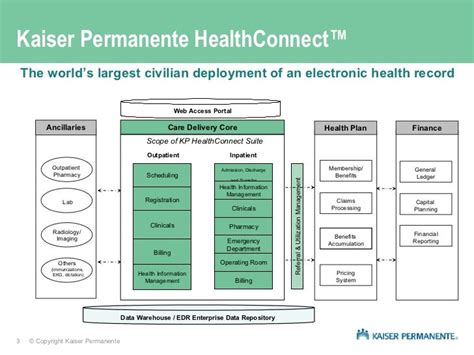Intro
Kaiser Permanente is a unique healthcare organization that has been a subject of interest for many due to its innovative approach to healthcare delivery and financing. As a leader in the healthcare industry, Kaiser Permanente has been often misunderstood as a for-profit organization. However, the truth is more complex.

To understand whether Kaiser Permanente is a for-profit organization, it's essential to delve into its history, mission, and business model.
History and Mission
Kaiser Permanente was founded in 1945 by Henry J. Kaiser and Sidney Garfield, with the mission of providing high-quality, affordable healthcare to the public. The organization started as a small hospital in Oakland, California, and has since grown into a massive healthcare system with over 12 million members across eight states and the District of Columbia.
Kaiser Permanente's mission is to provide high-quality, patient-centered care that is affordable and accessible to everyone. The organization is committed to improving the health of its members and the communities it serves.
Business Model
Kaiser Permanente operates as a not-for-profit organization, which means that it does not distribute profits to shareholders or investors. Instead, any surplus funds are reinvested into the organization to improve its services, facilities, and programs.
The organization's business model is based on a prepaid, group-practice approach, where members pay a monthly premium to receive comprehensive healthcare services. This approach allows Kaiser Permanente to manage care more effectively, reduce costs, and improve health outcomes.
Key Features of Kaiser Permanente's Not-for-Profit Status
Several key features distinguish Kaiser Permanente as a not-for-profit organization:
- No shareholders or investors: Kaiser Permanente does not have shareholders or investors who receive profits or dividends.
- Reinvestment of surplus funds: Any surplus funds are reinvested into the organization to improve services, facilities, and programs.
- Tax-exempt status: Kaiser Permanente is exempt from federal income tax under Section 501(c)(3) of the Internal Revenue Code.
- Community benefit programs: Kaiser Permanente invests in community benefit programs, such as charity care, health education, and research initiatives.
Benefits of Kaiser Permanente's Not-for-Profit Status
Kaiser Permanente's not-for-profit status has several benefits, including:
- Improved care quality: By reinvesting surplus funds, Kaiser Permanente can improve care quality, expand services, and invest in new technologies.
- Increased accessibility: Kaiser Permanente's not-for-profit status allows it to offer affordable healthcare services to a broader population.
- Community engagement: The organization's community benefit programs promote health education, research, and community outreach initiatives.
Challenges and Controversies
While Kaiser Permanente's not-for-profit status has several benefits, it has also faced challenges and controversies, including:
- Criticism of executive compensation: Kaiser Permanente has faced criticism for the high compensation packages of its executives, which some argue are excessive for a not-for-profit organization.
- Questions about tax-exempt status: Some have questioned whether Kaiser Permanente's tax-exempt status is justified, given its large size and financial resources.
Conclusion
In conclusion, Kaiser Permanente is not a for-profit organization. Its not-for-profit status is rooted in its mission to provide high-quality, affordable healthcare to the public. While the organization has faced challenges and controversies, its commitment to reinvesting surplus funds, improving care quality, and promoting community benefit programs demonstrates its dedication to its not-for-profit mission.
How Kaiser Permanente's Not-for-Profit Status Impacts Healthcare Delivery
Kaiser Permanente's not-for-profit status has a significant impact on healthcare delivery, including:

Improved Care Coordination
Kaiser Permanente's not-for-profit status allows it to invest in care coordination programs, which improve health outcomes and reduce costs. By integrating care services, Kaiser Permanente can provide more comprehensive and patient-centered care.
Increased Focus on Preventive Care
Kaiser Permanente's not-for-profit status enables it to prioritize preventive care, which is essential for improving health outcomes and reducing healthcare costs. By investing in preventive care programs, Kaiser Permanente can promote healthy behaviors and detect health problems early.
Enhanced Community Engagement
Kaiser Permanente's not-for-profit status allows it to engage with the community in meaningful ways, including through charity care programs, health education initiatives, and research collaborations.
Challenges in the For-Profit Healthcare Environment
While Kaiser Permanente's not-for-profit status has several benefits, it also faces challenges in the for-profit healthcare environment, including:
- Competition from for-profit providers: Kaiser Permanente faces competition from for-profit healthcare providers, which can make it challenging to maintain market share.
- Pressure to reduce costs: Kaiser Permanente must balance its commitment to quality care with the need to reduce costs in a competitive healthcare market.
Key Statistics and Facts About Kaiser Permanente
Here are some key statistics and facts about Kaiser Permanente:

- 12 million members: Kaiser Permanente has over 12 million members across eight states and the District of Columbia.
- 39 hospitals: Kaiser Permanente operates 39 hospitals, including several top-ranked hospitals in the United States.
- 700 medical offices: Kaiser Permanente has over 700 medical offices, providing convenient access to care for its members.
- $80 billion in annual revenue: Kaiser Permanente generates over $80 billion in annual revenue, making it one of the largest healthcare organizations in the United States.
FAQs About Kaiser Permanente's Not-for-Profit Status
Is Kaiser Permanente a for-profit organization?
+No, Kaiser Permanente is a not-for-profit organization, which means that it does not distribute profits to shareholders or investors.
How does Kaiser Permanente's not-for-profit status impact healthcare delivery?
+Kaiser Permanente's not-for-profit status allows it to invest in care coordination programs, prioritize preventive care, and engage with the community in meaningful ways.
What are the benefits of Kaiser Permanente's not-for-profit status?
+The benefits of Kaiser Permanente's not-for-profit status include improved care quality, increased accessibility, and community engagement.
